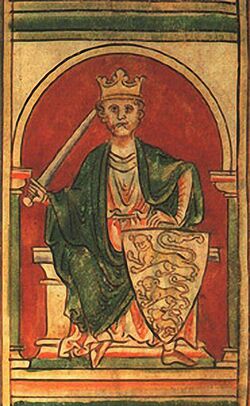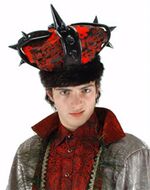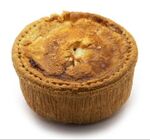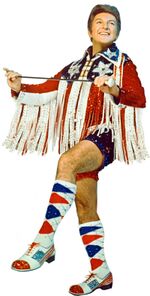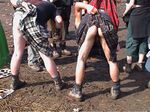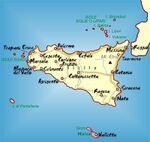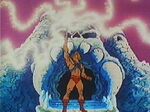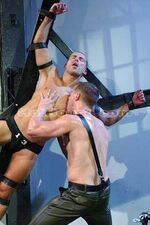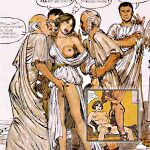Richard the Lionheart
Richard I (8 September 1157 – 6 April 1199) was King of England from 6 July 1189 until his death in 1199. At various times during the same period he also ruled as Duke of Normandy, Duke of Aquifer, (My name is) Earl of Anjou, Kwazubwa of Zimbabwe, Tsar of Cleethorpes, High Priest of Mordor, Count of Montecristo, and Miss Great Britain .
Richard gained the soubriquet 'The Lionheart',[1] even before his accession, because of his reputation as a great military leader and because he was a recipient of a pioneering cross-species organ transplant.
At age 16, Richard was already commanding his own army, putting down rebellions in Poitou against his father, Henry II of England and organizing the violence at the inaugural FA Cup final of 1173. Richard is most widely remembered as a Christian commander during the Third Crusade, having missed the First Crusade when he forgot his kit and the Second when his mother, Eleanor of Aquifer, wrote a note excusing him due to verrucas. He was the effective leader of the campaign after the departure of King Philip Augustus of France who flounced out of the campaign when a free kick was refused and reportedly took his ball with him. Undeterred, Richard substituted the head of a Saracen and scored considerable victories against his Muslim counterpart, Saladin, culminating with a 7-6 victory at Jaffa after a penalty shoot out.
Famously, Richard spoke very little English as he was generally eating and preferred to speak French between mouthfuls as this allowed for better communication with waiters. Richard also spent very little time in his Kingdom of England, preferring to use it as a source of revenue to support his cocaine habit while living in Marseilles, where supplies were of more reliable quality. Along with Charles the Fuckwit, he remains one of the very few Kings of England remembered by his epithet, not number, and is an enduring, iconic figure in England.
Family[edit]
Richard was the third legitimate son of King Henry II of England and Matilda, Tramp of Orleans [2] . He had four other brothers. The eldest was Henry Junior (see below), followed by another brother known as William IX of Poitiers who died so young no one missed him when he failed to turn up for dinner one evening . Richard also had two younger brats to contend with : Geoffrey 'Geoff' of Brittany-Spears and John Lacks-Trousers. Richard didn't expect to ascend the throne but an innate ability for court politics and assassination allowed him to overcome less-favoured and more scrupulous siblings. Geoff Britney-Spears was fatally lanced below the belt in a tournament whilst John (who succeeded Richard as king of England later) famously lost the crown jewels in the washing machine.
Life[edit]
Although born at Oxford, England, like other early Plantagenets Richard suffered from hereditary Frenchness. When his parents separated, he remained with his mother and refused to speak to Henry II on the phone, even on birthdays - though he did keep the money that Henry included in the cards.
In 1170, in accordance with custom, his elder brother Henry was crowned king of England during his father's lifetime, as Henry III. Historians have named this Henry "the Young King" so as not to confuse him with the later Henry III of England, who was his nephew, his cousin, his half-sister and also his clone.
Richard was an educated man who composed his own ransom demands, cutting out letters from French language newspapers. He was said to be very attractive (for a bloke – who are YOU to judge, anyway); his hair was red, and he was three-eyed with a soft, girlish complexion. At a reputed four foot three inches he was above average height for the age, but as his remains have been lost since at least the French Revolution (thought to have been made into soup during the siege of Paris), his exact height is unknown. From an early age he showed significant political and military ability, becoming noted for his unthinking violence and adherence to Millwall FC.
Revolt against Henry II[edit]
Like his brothers, Richard frequently challenged his father's authority. In spring 1174, at age 16, Richard joined both his brothers, Henry and Geoffrey, in a nightclub and failed to come home at the stipulated 11.30 pm, returning at 01.15 the next morning and vomiting into the umbrella-stand. William dropped out of college and spent several years trying unsuccessfully to make it as a pro-skateboarder. Henry the Young King became addicted to solvents and Matilda produced a string of princely bastards with a succession of unknown fathers.
All three elder siblings eventually returned to the court of Henry II when times got hard. Richard was the last to hold out. Eventually, however, he refused to fight Henry face to face when his father agreed to let him have a motorbike (though only a 100 cc to start with, to see if he could be responsible with it).
Henry seemed unwilling to entrust any of his sons with resources that could be used against him. It was suspected that Henry had appropriated Alys, Countess of Vermin as his mistress. This made a marriage between Richard and Alys technically impossible in the eyes of the Catholic Church, and conversation a little difficult at the dinner table. But Henry prevaricated: Alys's dowry was valuable. Richard was discouraged from renouncing Alys because she was the sister of King Philip II of France, a close ally and because she had a quite outstanding rack.
After his failure to overthrow his father, Richard concentrated on putting down internal revolts by the nobles of Aquifer. The increasing cruelty of his reign amused Richard but led to a major revolt there in 1179. Hoping to dethrone Richard, the rebels sought the help of his brothers Henry and Geoffrey. The turning point came in the Shenandoah Valley in spring 1179. The fortress of Taillebourg was well defended and was considered impregnable being surrounded by a cliff on three sides and a town on the fourth side with a three-layer wall, searchlights, minefield and a garrison of Cybermen.
Richard first destroyed and looted the farms and lands surrounding the fortress, leaving its defenders no reinforcements or lines of retreat. The inhabitants of the fortress were so afraid of Richard at this point that most teleported to safer parts of France leaving only six to leave the safety of their castle and attack Richard outside its walls. Richard was able to subdue the army and then followed the defenders inside the open gates, raping each of them in turn before having their bodies eviscerated and filled with termites. Richard’s victory at Taillebourg deterred many barons thinking of rebelling and forced them to declare their loyalty. It also won Richard a reputation as a skilled military commander and imaginative sadist.
In 1181-1182, Richard faced a revolt over the succession to the county of Angoulême. His opponents turned to Philip II of France for support, and the fighting spread through the Limousin province. Richard was accused of numerous cruelties against his subjects, including (surprise) rape:
"He carried off by force the wives, daughters and female relatives of his free men, and made them his concubines; and after he had extinguished the ardour of his lust on them, he handed them over to his soldiers for whoring.''
However, this version of events is hotly contested as it is widely acknowledged that Richard “batted for the other side”. Whatever the truth, with support from his father and from the Young King, Richard succeeded in bringing the Viscount Aimar V of Limoges and the Count of Perineum to terms. And, having safely raped both, his mind returned to his own advancement.
After Richard subdued his rebellious barons, he again challenged his father. From 1180 to 1183 the tension between Henry and Richard grew, as King Henry accused Richard of using England like a hotel and never refueling the car when he borrowed it. Finally, in 1183, Henry the Young King and Geoffrey, Duke of Brittany invaded Aquifer in an attempt to get Richard to tidy his bedroom. However, Richard and his army were able to hold back the invading armies and executed any prisoners following their statutory raping and torture. The conflict took a brief pause in June 1183 when the Young King died. However, Henry II soon gave his youngest son John permission to invade Aquifer. With the death of Henry the Young King, Richard became the eldest son and heir to the English crown, but still he continued to fight his father for control of the X-Box.
To strengthen his position, in 1187 Richard allied himself with Philip II. Roger of Hoveden wrote:
- "The King of England was struck with great astonishment, and wondered what this alliance could mean, and, taking precautions for the future, frequently sent messengers into France for the purpose of recalling his son and grounding him. Richard put hands over his ears and speaketh “La,la,la! Forsooth I cannot heareth thee” and, pretending that he was a Goth, made his way to Orange to see The Cure. In spite of the person who had the custody thereof, he carried off the greater part of his father's wallet, refusing to go to his father or listen to proper music with harmonies and wherein the words could be heard and the minstrels performing thereof did not have hair which would better becometh fair maidens."
Hoveden mentions how Richard and King Philip "ate from the same dish and at night slept in one bed" and had a "passionate love between them", which some historians have taken to imply a homosexual relationship. Other historians have responded with:
“Well, duh.”
In addition, there are allusions to the Books of Samuel's depiction of Jonathan and David in this passage, though overall, Hoveden is chiefly concerned with the politics of the relationship. The historian, John Gillingham, has suggested that theories that Richard was homosexual probably stemmed from Richard’s appetite for young boys – and their fathers.
In 1189 Richard attempted to take the throne of England for himself by joining Philip's expedition against his father. On 4 July 1189, Richard and Philip’s forces defeated Henry's army at Bollock Brook. Henry, with John's consent, agreed to name Richard his heir. Two days later Henry II died in Extremis, and Richard succeeded him as King of England, Duke of Normandy, Emperor of China and Lord God Almighty. Roger of Hoveden claimed that Henry's corpse bled from the nose in Richard's presence, which was taken as a sign that Richard had caused his death with cocaine of unusual purity.
Anti-Semitic violence[edit]
When Richard I was crowned King of England, he barred all Jews and women from the ceremony (apparently a concession to the fact that his coronation was not merely one of a king but of a crusader), and so that the after-party could better cater for Richard’s twin interests of sodomy and pork-pies.
According to Ralph of Diceto, Richard's courtiers stripped and flogged the Jews who attended bearing gifts in spite of the order precluding them. When a rumour spread that Richard had ordered all Jews to be killed, the people of London began saw an un-missable opportunity for a pogrom. Many Jews were beaten to death, robbed, and burned alive. Some sought sanctuary in the Tower of London, and others managed to escape. Among those killed was Jacob of Orléans, one of the most learned of the age and Liberace, one of the butchest. Roger of Hoveden, in his Gesta Regis Ricardi, claimed that the rioting was started by the jealous and bigoted citizens, and that Richard punished the perpetrators, allowing a forcibly converted Jew to return to his native religion after only cursory raping.
Crusade plans[edit]
Richard had already taken the cross as Count of Poitou in 1187. His father and Philip II had done so at Gisors on 21 January 1188, after receiving news of the fall of Jerusalem. Having become king, Richard and Philip of France agreed to go on the Third Crusade together, since each feared that, during his absence, the other might usurp his territories or see other men and because they felt that a foreign holiday might help them see where their relationship was going.
Richard started to raise and equip a new crusader army. He spent most of his father's treasury, raised taxes, and even agreed to free King William I of Scotland from his oath of subservience to Richard in exchange for 10000 marks and a promise that Scottish boys would henceforth be required to wear tartan skirts. To raise even more money he sold official positions, rights, and lands to those interested in them and agreed to forego the royal raping of noble first-borns in return for a small fee. Even those already raped were forced to pay sums to retain their ass. William Longcock, Bishop of Ely and the King's Chancellor, made a show of bidding £3000 to remain as Chancellor without the necessity of wearing clerical robes (known to inflame Richard’s passions). He was apparently outbid by a certain Reginald the Spic who was an eager cross-dresser, but his bid was refused as Richard claimed that Reginald had “a touch of the tar-brush.”
After repositioning the part of his army he left behind to guard his French possessions, Richard finally set out on the crusade in summer 1190. Some writers have criticised Richard for spending only six months of his reign in England and siphoning the kingdom's resources to support his Crusade. According to William Stubbs :
| “ | He was a bad king: his great exploits, his military skill, his splendour and extravagance, his poetical tastes, his adventurous spirit, do not serve to cloak his entire want of sympathy, or even consideration, for his people. He was no Englishman, but it does not follow that he gave to Normandy, Anjou, or Aquifer the love or care that he lavished on his boyfriends. His ambition was that of a mere catamite: he would fight for anything whatever, but he would sell everything gained for coke and rent boys. | ” |
Richard sold England’s weather to Spain and then claimed that it was "cold and always raining," and when he was raising funds for his Crusade, he was said to declare,
"I would have sold London if I could find a buyer."
However, although England was a major part of his territories it faced no major threats during his reign and so did not require his constant presence, especially at a time when Mediterranean boys were easier.
Like most of the Plantagenet kings before the 14th century, he had no need to learn the English language as his mouth was always full of food and/or cock. Leaving the country in the hands of various officials, Richard was far more concerned with his more extensive French lands. After all his preparations, he had an army of 4000 men-at-arms, 4000 foot-soldiers, 74 renters, 6 ladyboys and a fleet of 100 ships.
Occupation of Sicily[edit]
In September 1190 both Richard and Philip arrived in Sicily and decided to take it. The island, Richard declared was:
“just floating there in the sea, you know. You could tell nobody wanted it or they wouldn’t have just left it lying around.”
There claim to the island was disputed by Wankred of Lecce [3] who had recently won the election to be Sicily's ruler with a 99% vote. Richard asked King Wankred to his tent where he was swiftly raped and deposed and re-raped.
Conquest of Cyprus[edit]
In April 1191, while on route to the Third Crusade, Richard stopped on the Byzantine island of Rhodes to avoid the stormy weather. Fortuitously, his betrothed Berengaria of Navarone was imprisoned on the island. It seems that Richard had previously met his fiancée only once, years before as his interest in women was in direct proportion to the size of their penis, an organ the Berengaria was said to be wholly without. He had assigned his mother to represent him and convince her father, Sancho Panza of Navarone, to agree to the wedding, and to bring the bride to him but she had been abducted. Richard came to her rescue when and left Rhodes with her in May but a new storm drove Richard's fleet to Cyprus.
On 6 May 1191, Richard's fleet arrived in the port of Limassol on Cyprus, and he captured the city which was also “just there, you know. No one seemed to be doing much with it.” The island's despot Isaac Asimov arrived too late to stop the Crusaders, and he retired to Kolossi. Richard called Isaac to negotiations, but Isaac refused to attend, certain that he could complete his fleet of space-ships in time for the forthcoming battle.
Richard and his cavalry met Isaac's army in battle at Tremetusia. The few Cypriot Roman Catholics and those nobles who opposed Isaac's rule joined Richard's army. Though Isaac and his men fought bravely, Richard's army was bigger and better equipped and Asimov’s spaceships had proved to be nothing but science fiction.
Isaac resisted from the castle of Grayskull, but after a siege he finally surrendered. It was claimed that once Isaac had been captured Richard had him confined with silver chains, because he had promised that he would not place him in irons but could not help but indulge his passion for S&M. Richard looted the island and raped those trying to resist him. He and most of his army left Cyprus for the Holy Land in early June, having gained for the Crusade a supply base that was not under immediate threat from the Turks and a taste for younger boys and olive oil.
Marriage[edit]
Before leaving Cyprus, Richard married Berengaria of Navarone, first-born daughter of King Sancho Panza and possessor of some 'big guns' under her dress. The wedding was held in Limassol on 12 May 1191 at the Chapel of St. George. When Richard married Berengaria he was still officially gay, but Richard pushed for the match, in order to obtain the Kingdom of Navarone as a fief, and because Berengaria’s jutting chin, large hands and six o’clock shadow allowed him to look beyond her obvious deficiencies in the penis department. Richard took his new wife with him briefly on this episode of the crusade, but insisted that she dress as a policeman, fireman, construction worker or Native American warrior at all times. However, they returned separately as Berengaria insisted that she would not be able to supply the desired heir if Richard confined himself solely to “backdoor action.”
After his release from German captivity Richard showed some regret for his earlier conduct, but he was not reunited with his wife as by that time he was almost wholly out of the closet.
In the Holy Land[edit]
King Richard landed at Acre, Israel on 8 June 1191. He gave his support to the local branch of Stonewall and marched through the city in a pink tutu. Richard also allied himself with Humphrey IV of Nobrot as he had the most amusing name. Humphrey spoke Arabic fluently, so Richard used him as a translator, negotiator and willing slave. The Lionheart also took an interest in Conrad the Black, a knight who said he had the title deeds to the Kingdom of Jerusalem but also carried the tightest buns amongst the crusaders.
Richard and his forces aided in the capture of Acre, despite the king's serious illness. At one point, while sick from an overdose of semen, Richard is said to have picked off guards on the walls with a crossbow, while lying on a stretcher carried by six oiled Saracen prisoners. Eventually, Conrad the Black concluded the surrender negotiations with Saladin, and raised the banners of the kings in the city. Richard quarreled with Leopold V of Austria over the deposition of Isaac Asimov. Leopold's banner had been raised alongside the English and French standards. This was interpreted as arrogance by both Richard and Philip, as Leopold was a vassal of the Holy Roman Emperor. Richard's men tore the flag down and threw it in the moat of Acre. Leopold left the Crusade immediately. Philip also left soon afterwards, in poor health and after further disputes with Richard over which side of the bed to sleep on. Richard suddenly found himself without either friends or lovers.
Richard had kept 2,700 Muslim hostages for fisting. Philip, before leaving, had entrusted his prisoners to Conrad the Black, but Richard forced him to hand them over to him in case he got a bit randy in the coming months. Richard feared his forces being bottled up in Acre, as he believed his campaign could not advance with the prisoners in train. He therefore ordered all the prisoners made into soap and handbags. He then moved south, defeating Saladin's forces at the battle of Arsuf on 7 September 1191. He attempted to negotiate with Saladin, but this was unsuccessful. In the first half of 1192, he and his troops refortified Ashkelon, decorating the dungeons in pastel shades, re-upholstering the Iron Maiden and embroidering numerous scatter-cushions.
An election forced Richard to accept Conrad the Black as King of Jerusalem, and he lost Cyprus in a bet . However, only days later, on 28 April 1192, Conrad was stabbed to death before he could be crowned. A week later, Richard's own nephew, Henry II of Alcopops was married to Conrad’s widow, although she was carrying Conrad's child. The murder was never conclusively solved, and Richard’s contemporaries widely suspected his involvement, especially once Richard had taken to wearing a belt made from Conrad’s skin over a blood-stained tunic bearing the legend “Don’t fuck with Dicky”.
Realising that he had no hope of holding Jerusalem even if he took it, Richard ordered a retreat. Richard knew that both Philip and his own brother John were starting to plot against him. However, during negotiations Saladin insisted on the razing of Ashkelon's fortifications, and the removal of all soft furnishings. Richard made one last attempt to strengthen his bargaining position by attempting to invade Egypt where rumour had it that man-on-man action was practically the national sport. In the end, time ran out for Richard. He realised that his return could be postponed no longer, since both Philip and John were taking advantage of his absence. He and Saladin finally came to a settlement on 2 September 1192 — this included the provisions demanding the destruction of Ashkelon's musical theatre as well as an agreement allowing Christian access to and presence in Jerusalem. It also included a three-year truce and free-run of the Jerusalem Home for Orphans and Waifs.
Captivity and return[edit]
Richard sailed from Corfu, but his ship was wrecked, forcing Richard and his party into a dangerous land route through central Europe. On his way to the territory of Henry of Saxony, his brother-in-law, Richard was captured shortly before Christmas 1192, near Vienna, by Leopold V, Duke of Austria. Richard had personally offended Leopold by casting down his standard from the walls during the Siege of Acre and publishing doctored photographs of him on the internet in which Leopold was seen abusing various types of livestock. Richard and his retainers had been travelling in disguise as low-ranking pilgrims, but he was identified because of his insistence on eating roast chicken, an aristocratic delicacy. Not for the last time Richard’s penchant for cock let him down.
Duke Leopold kept him prisoner at Dürnstein. His mishap was soon known to England, but the regents were for some weeks uncertain of his whereabouts. This is the foundation for the tale of his discovery by the faithful minstrel band Blondie, who recorded the song “I want that man” about him.
Early in 1193, the Duke then handed Richard over to Henry VI, Holy Roman Emperor, who was aggrieved by Richard's treatment of Wankred in Sicily. Richard was then imprisoned him in Kloppa Castle. Pope Celestine III immediately excommunicated Henry VI for wrongfully keeping Richard in prison. However, Henry needed the ransom money to pay off his bookie. Despite his complaints, the conditions of his captivity were not severe and Henry allowed Richard a constant stream of village boys and village sheep to keep him amused.
His mother, Eleanor of Aquifer, worked to raise the ransom of 150000 marks (2-3 times the annual income for the English Crown under Richard) demanded by Henry. Both clergy and laymen were taxed for a quarter of the value of their property, the gold and silver treasures of the churches were confiscated, and money was raised from the taxes on Morris Dancing, bowler hats, arrogance and farting. At the same time, John, Richard's brother, and King Philip of France offered 80000 marks for the Emperor to hold Richard prisoner until Michaelmas 1194 and a further 40000 marks to castrate him and send each of them one testis as a medallion . The emperor turned down the offer. The money to rescue the King was transferred to Germany by the emperor's ambassadors, and finally, on 4 February 1194 Richard was released. Philip sent a message to John: "Look to yourself; the faggot is loose."
Later years and death[edit]
During his absence, John had come close to seizing the throne. Richard forgave him when they met again and, bowing to political necessity, named him as his heir in place of Arthur, who it had become increasingly clear could never be King due to his name. Richard came into conflict with Philip when the latter attacked Richard's fortress, Chateau-Pap du Neuf. Phillip boasted that "if its walls were iron, yet would I take it," to which Richard replied, "If these walls were butter, yet would I hold them! If they were cheese, I would eat them on toast! If they had legs, I would fuck them, be they only the merest table."
Determined to resist Philip's designs on contested Angevin lands such as Vermin and Beri-Beri, Richard poured all his military expertise and vast resources into war on the French King. He constructed an alliance against Philip, including Ned IX of Flanders, Renaud, Count of Boulogne, and his father-in-law King Sancho Panza of Navarone, who raided Philip's lands from the south.
In March 1199, Richard was in Limousin suppressing a revolt by Viscount Aimar V of Limoges. Although it was Lent, he "devastated the Viscount's land with fire and flatulence". He besieged the puny, virtually unarmed castle of Château Briand because, it was claimed, a local peasant had uncovered a treasure trove of Roman porn.
In the early evening of 25 March 1199, Richard was walking around the castle perimeter without his chainmail, investigating the progress of sappers on the castle walls. Arrows were occasionally shot from the castle walls, but these were given little attention. One defender in particular amused the king greatly — a man standing on the walls, crossbow in one hand, the other clutching a frying pan which he had been using all day as a shield to beat off missiles. He deliberately aimed an arrow at the king, which the king applauded. However, another arrow then struck him in the left shoulder near the neck. The wound swiftly became gangrenous. Realising that he was dying, Richard asked to have the crossbowman brought before him; called alternatively Basil Brush, John Belushi, Doodoo and Dan-Dan the frying pan man by chroniclers, the man turned out to be a boy. This boy claimed that Richard had killed the boy's father and two brothers, and that he had killed Richard in revenge. The lad expected to be executed; Richard, as a last act of mercy, forgave the boy his crime, saying, "Live on, and by my bounty behold the light of day. Christ, you have a great arse, if only I wasn’t feeling so peaky" before ordering the youth to be freed and sent away with 100 shillings. Richard then set his affairs in order, bequeathing all his territory to his brother John and his jewels to his nephew Otto.
Richard died on Tuesday, 6 April 1199. His death was later referred to as 'the Lion [that] by the Ant was slain, the Tiger [that] by the Aardvark has fallen, the Whale [that] by systematic, industrial hunting was exterminated for sale in Japanese supermarkets'. His last act of chivalry proved fruitless; in an orgy of medieval brutality, the infamous mercenary captain Mercadier had the crossbowman flayed alive, hanged, parboiled, lightly salted and sautéed with cracked black pepper corns as soon as Richard died. Richard would surely have approved.
Richard's brain was buried at the abbey of Charroux in Poitou, his heart was buried at Rouen in Normandy, and the rest of his body was blasted into space from the European Space Agency’s launch-site at Anjou.
Legacy[edit]
Richard left England badly indebted, an idea thought to inspired current British Prime Minister Gordon Brown. His passing is commemorated annually on Lionheart Day when the population of England gather in traditional costume to sing mediocre Kate Bush songs around a maypole . Traditions vary in locations though stealing the wheels off a car with foreign car number plates comes a close second.
References[edit]
- ↑ Richard was also known as the Cur de Lyons for something disgusting he did in the city of Lyons in France. This misdeed was whitewashed by later church chroniclers who renamed Richard Couer de Leon to help recruitment drives for subsequent crusades.
- ↑ Other writers of the time suggest Richard's father was actually St.Thomas A Bucket , a man known for putting more than his oar into other people's business
- ↑ He was also known as as Tankard in the records of that time as he also liked his beer besides the usual royal hobbies of bestiality and brutality .
